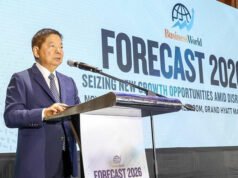Infrastructure spending falls as of end-Feb. — DBM
By Beatrice M. Laforga
Reporter
STATE SPENDING on infrastructure fell by 21% as of end-February on high base effects, with the downward trend expected to continue throughout the first half as strict lockdown measures halted implementation of projects.
Data from the Department of Budget and Management (DBM) showed infrastructure and other capital outlays declined to P93.9 billion in the first two months of 2020, from P118.4 billion a year ago.
“The decrease is mainly attributed to the base effect of high infrastructure expenditures in the same period last year brought about by the payment of prior years’ accounts payable for completed projects of the Department of Public Works and Highways (DPWH),” the DBM said.
The DPWH’s prior years’ accounts payable for projects in January to February slid 57% to P35.2 billion from P82.2 billion during the same period in 2019.
In February alone, infrastructure spending fell 9.3% to P45.6 billion from P50.3 billion recorded a year ago, posting its first year-on-year contraction in four months or since October’s 12.92% decline.
Overall, DBM said disbursements reached P244.4 billion in February, down by 12.2% from a year ago, “attributed largely to the base effect of the Internal Revenue Allotment of LGUs for January 2019 which was released in February last year, as well as lower interest payments.”
For the first two months of 2020, national government disbursements rose 5.2% to P516 billion from the P490.7 billion a year prior.
“While disbursements for March, and consequently the first quarter of this year, will be higher year-on-year, spending will likely be lower than the program with the temporary delays in program/project implementation as a result of the imposition of the enhanced community quarantine (ECQ) due to the coronavirus disease 2019 (COVID-19) pandemic,” the department said.
The government placed Luzon under ECQ in mid-March in an effort to contain the spread of COVID-19. The ECQ halted nearly all economic activity in Luzon, which accounts for over 70% of the country’s gross domestic product.
ING Bank N.V.-Manila Senior Economist Nicholas Antonio T. Mapa said the pullback in infrastructure spending, which should have been “a key part of the growth story” this year, could be traced to disruptions caused by the Taal Volcano eruption in late-January and the onset of coronavirus outbreak in China, which may have cut off supply of raw materials and capital goods for construction.
“We expect a sustained period of decline going into March, April and May with only flat growth in second half, despite government’s directive to continue ‘Build, Build, Build’ post-ECQ. Construction activities will be hampered as social distancing limits workers ability to build,” Mr. Mapa said in an e-mailed response.
Security Bank Corp. Chief Economist Robert Dan J. Roces said infrastructure expenditures are seen to continue to decline in March as the construction of big-ticket infrastructure projects were stopped due to the ECQ, as well as the “reprioritization” of the government’s focus to address the health crisis.
“Infra spending in March will be much lower due to a halt in big-ticket infra projects due mainly to the ECQ and a reprioritization of government initiatives,” he said via e-mail.
Mr. Roces said infrastructure spending will likely surge in the third quarter as the “revival of the ‘Build, Build, Build’ will be one of the main drivers of economic recovery.”
DBM said it expects overall state spending to increase in the next few months as the government spends heavily on pandemic responses such as purchase of medical supplies and equipment, implementation of cash subsidy programs and the one-time Bayanihan grant to local governments.
“Spending for rest of the year will continue to be driven largely by the implementation of COVID-19 related programs, activities, and projects (PAPs), as well as other measures or strategies identified and recommended by the Inter-Agency Taskforce for Emerging Infectious Diseases (IATF-EID) Technical Working Group on Anticipatory and Forward Planning (TWG-AFP) on how to move forward with the ‘New Normal’ situation given the pandemic,” DBM said.



